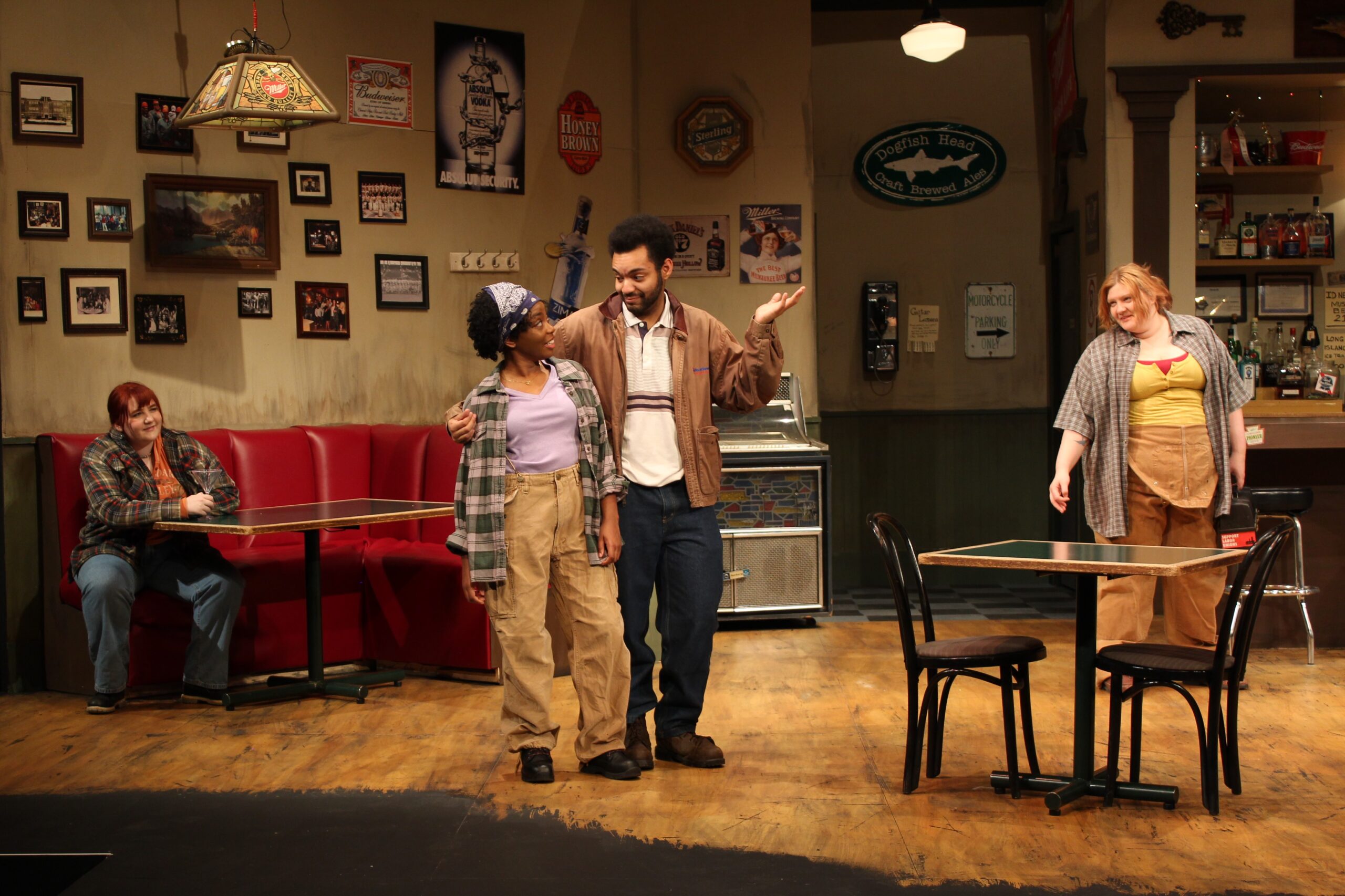Julie Jakubiak, Caisey Cole, Jaime Irvin Young, & Tabby Jackson in Sweat. Photo: IUS
Sweat
By Lynn Nottage
Directed by Tyler Tate
Produced by Indiana University Southeast Theatre Department
A review by Tory Parker
Entire contents are copyright © 2023 by Tory Parker. All rights reserved.
During the intermission for Sweat I was thinking about how the youngest member of the cast, age 20, was not yet born in 2000, when the majority of the play takes place—and that they were only 5 years old in 2008, when the other portion of the play is set, and that I hoped with all my heart they don’t remember anything about that time, that life remained so unchanged for them that all they can remember is kindergarten and whichever variation of the clue-finding man was on Blue’s Clues by that point. I’m thinking now about how many parents and grandparents have had that thought while watching their kids perform in productions of Death of a Salesman, Our Town, A Raisin in the Sun, Twelve Angry Men, or any other of these “state of our nation” plays. “They don’t know what it was like,” we think. “They couldn’t possibly know.”
Lynn Nottage’s Sweat was published in 2015 and won the Pulitzer Prize for drama in 2017. That 2 year divide is important, because between its first production and its rise to mega-acclaim, Donald Trump won the presidency. And all across the nation, every news outlet, radio program, late night talk show host, pantsuit nation Facebook poster and neo-lib podcaster was asking the same question: “How did this happen?” Sweat had answered before they thought to ask.
Sweat takes place in a fictional bar in Reading, Pennsylvania in 2000 and 2008. In 2000, the factories that built the town and sustained the people living there for more than 70 years are starting to ship jobs overseas, causing anxiety and unrest in the community. Tensions grow progressively higher as management backs unions into the corner, forcing people into impossible positions, robbing them of what they believed, as company folk, they were promised. As pressure continues to rise, the people of the town are crushed, feeling abandoned, cheated, and forgotten. They draw lines along race and economic background, and the community tries to cope any way they can.
It’s a testament to director Tyler Tate that the energy in the performances never dipped so low as to lose the audience. The play is a marathon, and we watch the resentment between friends, the animosity between those employed and those out of work, the need for a scapegoat within your grasp that leads to racial and ethnic violence unfold subtly, artfully, until it is suddenly exploding.
The show begins with Jason (Daniel J. Barrett) and Chris (Kevon Shares) reporting to their parole officer, Evan (Adama Abramson) on their reentry into the civilian world after 8 years in prison. We don’t know exactly what it is they did to get there until the very end of the play, but we know these are not the same men who we meet in flashing back to 2000.
With this harrowing introduction, we’re shot back to 2000—the bar tv cleverly plays ads and programs during scene changes, placing us not only in the right year, but in the specific month, the specific climate, using footage of movie trailers, commercials, and news coverage (specifically coverage of the 2000 presidential debates and election). Similarly, the jukebox plays the music of the day to lead us into each scene—in an absolutely DOPE playlist, which I would love a Spotify link to if it exists. The set is meticulous and magnificent, a perfectly homey dive bar in middle America in Y2K, right down to the vinyl booth and the Zima cut out on the wall.
And it all made me think about how little these students must know about this era, how this is in every sense a “period piece” to them. But that’s not true, really. These students live and work and play and study in Indiana, right next to Kentucky, and they know what happens when economic distress falls on communities already struggling with feeling left behind. They’ve gone to school and grown up in the midst of a pandemic, and they know what it means to try to do what’s right when your leaders and politicians seem to have abandoned you.
This is a heavy show, but they never falter under the weight of it. Each of them gives a broad and fearless performance, which I am sure is the work of a director who has never given less than his boldest and best performance onstage. It would be easy for a bunch of young people, most of whom are playing adults 50-70 years old, who have lived hard, gritty lives, to play them as caricatures of grown ups, but that never happens.
Branden Gliebe, who plays the warm-but-stoic bar manager, Stan, could easily slip into a grumpy old man, but his gentle gruffness is the perfect foil to the larger than life characters so at home in his bar. Tabby Jackson brings a manic anxiety to Tracey, and we watch the passion and joy that shape her at the beginning warp into tragedy indicative of so many like her who got left behind and run over by a post-industrial America.
At the center of the complicated web is Cynthia (Caisey Cole), a long-time factory floor worker who has recently gotten a position in management. Cynthia and her husband, Bruce (Jaime Irvin Young), have both worked in factories, both fought with their unions, and have raised their son, Chris, to do the same. Their parents, Black at a time when that barred them from those factory jobs, fought to get them there, and they continue to face the dehumanization of having to fight for jobs in the industries and the town into which they were born. Cole and Young are astounding to watch. They are vibrant, grounded, they relish in the couple’s complicated chemistry and history, and they lift the performances of every actor with whom they share a scene.
There are no villains in the ensemble of Sweat. The villains exist outside of the world of the play—their names and reputations control the fates of our characters, they are part of the system determined to bleed dry every last cog in our relentless, capitalist machine. These people in Stan’s bar will likely never meet them, and yet they hold their lives in their hands. And, just as in real life, in the absence of a tangible villain, those who feel entitled to a better fate due to legacy (and in this case, to whiteness) create one. It’s a brutal, grotesque mirror Nottage holds up to us—just as hard to look into now as it was in 2015. Perhaps harder, for in this instance, we see it from the eyes of students whose world has been irreparably mutilated by this greed.
Sweat
Featuring Tabby Jackson, Julie Jakubiak, Daniel J. Barrett, Caisey Cole, Branden Gliebe, Kevon Shares, Jaime Irvin Young, Azzam Azzam, Adama Abramson
February 24 – March 5, 2023
Indiana University Southeast Theatre Department
The Ogle Center
4201 Grant Line Road
New Albany, IN 47150
Tory Parker, originally from West Virginia, is now a proud Kentuckian as well. In Louisville, she’s worked and/or performed with Actors Theatre of Louisville, Claddagh Theatre Company, the Chamber Theatre, Bellarmine University, Wayward Actors Company, Derby City Playwrights, Company OutCast, Highview Arts Center, and director Emily Grimany. She is a co-founding artist of the queer theatre collaborative, three witches shakespeare. As a playwright, her original works appeared in the National Women’s Theatre Festival in their 2020 and 2021 Fringe Festivals.





